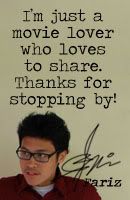Plot: After being overthrown, a Chilean dictator of 15 years made a referendum to ask the public of Chile to vote whether they wanted him to stay in power by voting Yes or they wanted a democratic election by voting No. This film depicted the process of both ad campaigns presenting their point of views on the television.
Another submission for World Cinema Series 2013, hosted by Caroline.
Review: Some people say that those who own the media, have the world on the palm of their hands. Marketing and advertisement, if done right, both have proven that they can successfully persuade or even manipulate a large mass of people, even changing history of a nation. That's what Pablo Larraín wanted to show with his film, No. Based on an actual historic events of Chile, No was the first time for a Chilean film to be nominated in Best Foreign Language Film at the Academy Awards. Starring the already worldwide famous actor, Gael García Bernal as René Saavedra, who worked in an advertising agency. The year was 1988, the time when the public of Chile was asked to vote whether they want General Pinochet to be in charge of their country again after 15 years of dictatorship or they wanted to have a democratic election. In the national voting, public would be given 2 options, Yes or No. Both parties were given a chance to represent their promotions/rebuttals for 15 minutes each night in a television special program for 27 days before the election. René was asked by his longtime colleagues to participate on the No campaign. He hesitated at first, but wanting a better future for his country and kid, René then got on board. Being the 'government's enemy' was already too much on his plate, yet René learned that his boss at the agency was working on the Yes campaign.
What I like about No is this film shows how powerful advertising can be. I think most of us would already know, or even rightly guess the outcome of the election. But its tight and quite clever script portrayed the process leading to that. It's interesting to know that the No campaign was using the bright, cheerful and rainbow-filled images to portray freedom if Pinochet no longer had power. They even used jingle and appearances by certain popular art workers to attract the younger voters. This decision was heavily criticized at first by some of older No campaigners who think it was a disgrace by sugar-coating the horrible acts that occurred under Pinochet regime. They wanted to use images of demonstration, the brutality of cops and the testimonials of parents whose kids were abducted and never seen ever again. But René and his peers showed that by adding this kind of promotion (the cheerful ones), they could appeal broader audiences, the youth and working middle-aged women, who in recent survey (that time) were the ones that unlikely to participate or they think they had a good living condition already. Even Rene's housekeeper (or maid?) would have voted Yes, just because she had a 'pretty good' life so far and wouldn't want that to be taken away. And even more interesting, how the Yes campaign was so desperate that they always had a way to bash or even made parodies of their opponent's ads. The good thing was the people in No campaign never let that get to their emotions.
The first thing you will notice while watching this film is how this film was shot. The film was shot using a low definition, ¾ inch Sony U-matic magnetic tape. It made the whole film looks like a vintage, 80s TV documentary. Don't let these images here fool you, cause I couldn't find the actual stills from the film in the web. I think the reason why Larraín decided to make No this way is to give viewers a very authentic watching experience, by depicting exactly like how the public watched TV programs back then. This way of unique presentation might not be everyone's cup of tea. Whether they will get the idea and deem it as 'fresh' and authentic, or they see this as cheap and distracting. I had to adapt to this old-fashioned touch at first, but I got myself adjusted after awhile. Though I think some of the scenes were too agitating. The production design was also accurate (I think so) to present the 80s attire and atmospere. Some of the reviews I read regarding this film are saying this film is funny, but I can't really recall myself laughing. Or maybe I didn't understand the satirical jokes. And to be quite honest, I'm the last person you would talk to about politics. Not being a big fan of politics, there were a few confusing scenes, but fortunately that's not much of a problem. There are also bunch of good scenes; the creative process of ad-makings, the thrills of being terrorized by Pinochet cronies, or that gripping last 20 minutes of the film (that somehow reminded me so much of Argo). Too bad that Rene's family and personal plot wasn't that engaging and I think it's not one of Bernal's best performances. But it's quite okay.
Overview: No was actually a pretty decent film. It smartly presented the atmosphere of Chile in the 80s; the costumes, the TV programs, even the usage of vintage low definition camera. The story was powerful and clearly showed us on how marketing and advertisement are both crucial and beneficial to present the public a certain image and/or point of view. The script and direction were good, still entertaining, and at times gripping, even though I already know the ending. The style of camera might be distracting and 'weird', but I get the reason why Larraín used it. It lost the Oscar to the much higher profile and critical darling, Amour. But I think a nomination itself already an honor to this adaptation of historic events and quite well-made film. Congrats Larrain and congrats Chile!
No (2012) | Chile | 118 minutes | Drama, History | Rated R for language | Cast: Gael García Bernal, Alfredo Castro, Luis Gnecco, Antonia Zegers, Marcial Tagle, Néstor Cantillana | Written by: Pedro Peirano | Directed by: Pablo Larraín


















This sounds interesting. I haven't seen it yet.
ReplyDeleteFilming this in 80s documentary style sounds like a good idea. Overall it sounds as if it was a bit lacking in the emotional department.
The 80s tv-doc style, for me, is interesting too, even at first it's distracting. There were a few emotional scenes (relationship between Rene and his son, etc) but I personally think it's not that engaging. That's just me, though :)
Deletewaaaahh, ini nonton dmn? dari kemarin pengen nonton film ini, tertarik sm judulnya yg unik sih, hehe. btw, boleh tukeran link? http://rizky-muzakki.blogspot.com/ :D
ReplyDeleteDonlot :p
DeleteSip, udah di link balik!
great review, Fariz! I think this is the first time I read a full English review in your blog...I like it :)
ReplyDeleteSame with you and Caroline, the 80s documentary style makes me curious about the movie...the story itself is not that intriguing for me.
Thank you, Miss :) I actually had already posted another full English review before this one (also for World Cinema Series) :)
Delete